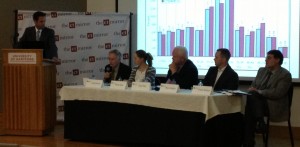CT Should Look to New York, Aging Workforce, Urban Centers to Rebuild Economy
/
Connecticut would be foolish not to take greater advantage of the fact that nearly one-third of the state is within the financial orbit of New York City as it looks to rebuild its economic strength – while not overlooking the potential for entrepreneurial activity across the state.
Those were among the lead suggestions of a panel of economists and entrepreneurs at the University of Hartford looking at job prospects for today’s 20-somethings, in a program sponsored by CT Mirror.
Daniel Kennedy, Senior Economist in the Office of Research at the state Department of Labor emphasized that the strongest economic growth in the state in the years to come will be in Fairfield County, and evidence of that trend is already present in the current economic recovery.
Wayne Vaughn, president of Hartford-based Fuscient, which he launched in 1997, said the state should “play to its strengths,” in looking to Fairfield County. He said that New York City's immense economy "bleeds over into one-third of our state." He also called on the state’s colleges and universities to step up efforts to match students with mentors in the business community, to improve their workforce readiness.
The state’s college graduates should not sell the state short, offered Katelyn Anton, Community Manager of New Haven-based Independent Software, and a key contributor to Whiteboard, a popular blog for the technology and entrepreneurial community in the state. “Connecticut is one of the ripest locations in the world,” for start-up ventures, she said,  noting the growth of co-working spaces in New Haven, Hartford, Bridgeport, Manchester and other communities, and the numerous incubator opportunities that individuals “can tap into.”
noting the growth of co-working spaces in New Haven, Hartford, Bridgeport, Manchester and other communities, and the numerous incubator opportunities that individuals “can tap into.”
Connecticut Business and Industry Association (CBIA) economist and vice president Peter Gioia predicted that the state’s economy is “on the cusp of turning the corner,” noting that between 15 and 20 percent of today’s workforce will be retired within five years – creating job vacancies and opportunities for young people. He predicted that as the workforce ages out of the market, the state’s workforce will need electrical line workers, plumbers, electricians, commercial loan officers, actuaries and financial planners, and some of that need is already apparent.
Gioia praised the state’s recent efforts to bolster the University of Connecticut and the state’s community colleges, underscoring the correlation between “where students go to school and where they get their first job.” If students stay in the state for college, Connecticut businesses will ultimately benefit.
Kennedy said the state’s prolonged economic recovery is characterized by continued “demand deficient unemployment,” which is more structural than merely a reaction to the national downturn that began in 2008. He indicated that even as some sectors are improving, many millennials remain underemployed -college graduates working in service, rather than professional, industries.
“More people are working, but they’re not making as much,” said Orlando Rodriguez, a senior policy fellow at Connecticut Voices for Children. “For every job we lose in the financial industry, it takes eight and a half jobs in the restaurant industry.”
Rodriguez also raised a cautionary note, stating that Connecticut should be particularly concerned about young people in the state’s urban centers who do not attend college, and often are unable to obtain a first job. While statewide unemployment hovers around 8 percent, it can run as high as 40 percent among 18-24 year olds in Bridgeport and other urban communities. “Connecticut’s future,” Rodriguez said, “is in urban areas.”
Gioia was strongly critical of Congressional inaction on immigration reform, stating that the nation’s economy would be strengthened by a comprehensive policy. “Immigrants are much more likely to start a business, and become net employers of Americans.” He said the policy of educating foreign students, but not permitting them to then remain in the U.S., as “ridiculous.” He also cited Canada as an example of a nation that has been more welcoming of immigrants, to the benefit of the nation’s economy.
Vaughn said that while his biggest challenge in doing business in Connecticut is retaining talent, the growth of technology in business transactions offers businesses here significant opportunities. “Where your business is located doesn’t dictate who your customers are,” he said.
The discussion was the second of nine panels on a range of topics sponsored by The Connecticut Mirror to be held around the state in coming months. It was moderated by Brett Ozrechowski, CEO-Publisher of the CT News Project, which operates CT Mirror. Next month, discussions will be held Nov. 7 at Fairfield University focused on measuring good teaching and Nov. 18 at the University of New Haven on the topic of the clean energy economy.






























